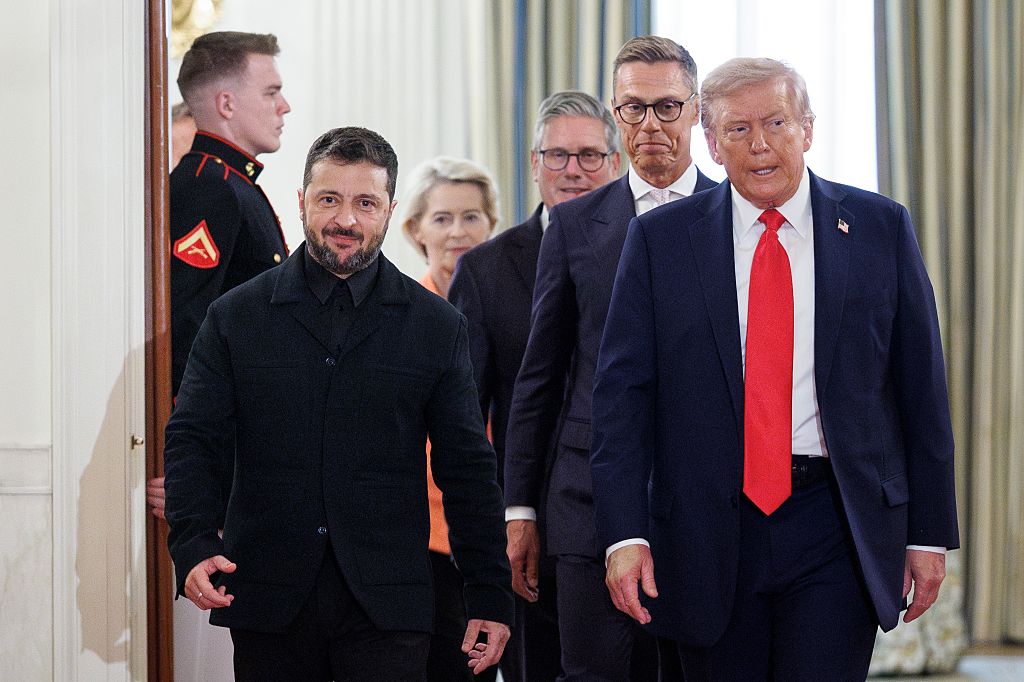Apostolos Thomadakis is Research Fellow and Head of the Financial Markets and Institutions Unit at the Centre for European Policy Studies (CEPS), and Head of Research at the European Capital Markets Institute (ECMI).
The latest revelations about Ukraine’s proposals to Washington are telling. Kyiv is preparing to pledge $100 billion in American weapons purchases, financed largely by the EU, in exchange for US security guarantees after a peace deal with Russia.
On top of this, Ukraine has offered a $50 billion drone production partnership with US firms. These proposals are designed to appeal to President Trump’s transactional instincts, but they also expose an uncomfortable truth: Europe pays the bill while Washington writes the script.
The same imbalance is visible in trade. The EU has just concluded a tariff deal with the US that many in Europe regard as a capitulation. Facing the threat of 30% tariffs, Brussels accepted a 15% tariff on most goods, kept 50% tariffs on steel and aluminium and pledged hundreds of billions in US gas purchases and investments. The outcome may have prevented an immediate trade war, but it reinforced a pattern: Washington sets the terms, Europe absorbs the costs.
Taken together, these two developments point to a dangerous trajectory. On both security and trade, the EU has drifted into the role of payer and middleman, financing arrangements that serve US priorities while limiting its own ability to act independently.
In Ukraine, Europe risks being reduced to financing American weapons and underwriting Trump’s ‘deal-making’, rather than defining the conditions of peace and stability on its own continent. In trade, Europe has accepted asymmetric concessions that weaken its negotiating leverage and signal vulnerability.
The ceasefire discussions show how dependent Europe has become. In Washington, German Chancellor Friedrich Merz was reduced to pleading with President Trump to secure a ceasefire with Russia, presenting Europe’s position as reactive and dependent.
Ukraine, for its part, rightly insists that any settlement must not rest on concessions to Moscow. But the fact that Kyiv courts Washington rather than Brussels for security guarantees reveals how absent the EU remains from the geopolitical table.
Europe must break this cycle. By playing the middleman – between Washington and Kyiv, between Washington and Moscow, between Washington and its own member states – the EU abdicates its role as a shaper of outcomes and confines itself to footing the bill.
What would leadership look like?
Europe should no longer limit itself to financing other people’s strategies. It must set its own. That means designing a European security framework for Ukraine, anchored in EU and NATO commitments, with American support but not American primacy. It means pursuing trade policy from a position of strength, resisting coercion and diversifying energy and technology partnerships so Europe cannot be held hostage.
It also means unity of purpose: a coordinated diplomatic initiative that frames the ceasefire and peace process in terms of Europe’s own security order, not America’s electoral calendar.
For years, the EU has spoken about becoming less dependent on others for its security – what policymakers call ‘strategic autonomy’. The twin challenges of war in Ukraine and economic coercion from the US show that this must move from rhetoric to reality.
The Ukrainian document itself notes that “lasting peace shall be based not on concessions and free gifts to Putin, but on a strong security framework that will prevent future aggression”. Europe must ensure that framework is European-led – otherwise, it risks financing an American-designed settlement that leaves its own security fragile.
The tariff deal offers a parallel lesson. A Union that cannot defend its own economic interests will struggle to defend its security interests. History will not judge Europe kindly if it remains a middleman – paying, pleading and reacting – rather than leading.
At stake is not only Ukraine’s sovereignty but Europe’s credibility as a geopolitical actor. The time has come for the Union to stop paying for other people’s strategies and start writing its own.
